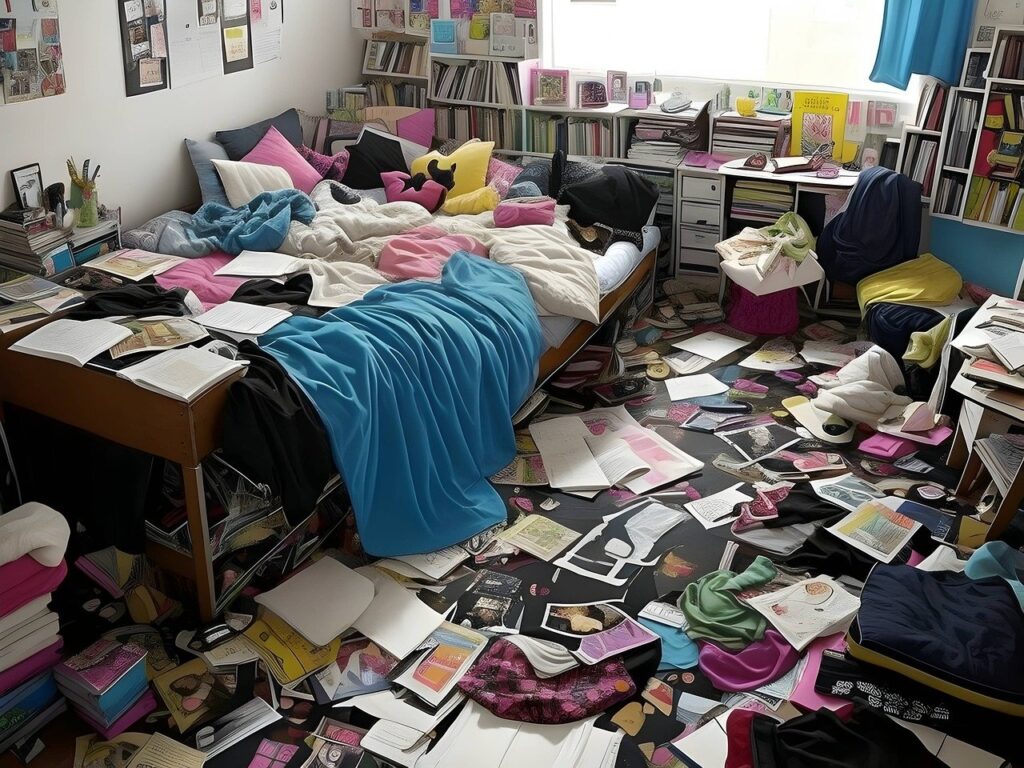Does a quick glance at the stack of mail, bills, receipts, and other papers on your kitchen counter speed up your heart rate? Do you feel a headache coming on at the sight of your bedroom with clothes, shoes, and books strewn about the furniture and floor? Maybe your chest tightens when you return to your desk and it’s covered in files, post-it notes, and unfinished to-do lists?
No matter how or where clutter shows up in your life, it tends to elicit unwanted feelings and negative reactions. On the other hand, something as simple as clearing up the mess can improve your mood—and your well-being.
The psychological effects of clutter
Your work and home environment can significantly impact your mental health. How you feel in a cluttered space can extend to your brain and affect how you function throughout the day. Here are a few ways that could unfold:
- Stress. People are more likely to feel anxious in a cluttered home or office and calm in a well-organized space. The stress may come from not knowing where things are or worrying about accumulating additional messiness.
- Distraction. When a room is chaotic, it’s hard to stay on task because too many things are competing for your limited attention. It’s easy to lose focus and let your mind wander as a result.
- Isolation. If your home is cluttered, you may feel compelled to shut people out to avoid judgment and embarrassment. This can make it difficult to maintain healthy relationships, which could lead to loneliness and even contribute to depression.
- Self-neglect. When you fail to take care of your surroundings, it can jeopardize your health and safety. Clutter, and specifically hoarding, is linked to unhealthy eating and sleeping habits. And, of course, too much stuff in your house could get in the way and cause injuries from trips and falls.
Tips to eliminate the clutter
If you struggle with taming the clutter in your home, the idea of cleaning up the mess and organizing your belongings may feel daunting. On the other hand, if you successfully eliminate the clutter, you may find yourself with more energy, less stress, a sharper focus, and improved mental health.
Are you ready to take on the clutter in your space? These tips can help:
- Take small steps. Start with a small goal each day, such as sorting and organizing one dresser drawer or closet shelf. If the task is too big and overwhelming, you may decide not to do it at all. However, accomplishing one small task at a time feels good and motivates you to take on another one the following day.
- Ask for help. Involve the help of a friend or family member to make the task more manageable and to hold you accountable. That person could help you transport trash to the curb for pickup or simply provide much-needed encouragement. Whatever the case, their support will have a positive impact.
- Make it fun. Clearing out a cluttered space probably won’t be your favorite way to spend free time, but it doesn’t have to be a dreaded task. Create a great playlist to inspire you while you eliminate clutter. Or make a rule that you can only listen to your favorite podcast when you’re cleaning as an incentive to get the work done.
If cleaning up the clutter in your house still feels like too much, it may be time to call in the professionals. A professional organizer can provide structure and advice throughout the process and also monitor progress. If emotional issues are getting in the way, a therapist or support group can help you work through those challenges and eventually restore and maintain order in your space.
Image by alper omer esin from Pixabay
Dr. David Lowenstein is a Columbus, Ohio-based psychologist with more than 35 years of experience. He conducts individual, family, and group therapy sessions in his German Village office and also via telehealth. Dr. Lowenstein is also available for expert forensic testimony, and for educational workshops and presentations. He is frequently called upon as an expert source for print, radio, and broadcast media. Contact Dr. Lowenstein at Lowenstein & Associates, 691 South Fifth Street, Columbus, Ohio, 43206, or call 614.443.6155 or 614.444.0432.


